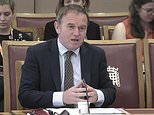UK government has ‘no intention’ of telling public to eat less meat
Environment Secretary George Eustice reveals Britons WON’T be told to eat less meat to halt global warming because humans are ‘ultimately omnivores’
George Eustice spoke at an Environment and Climate Change Committee inquiryHe said that Boris Johnson’s government won’t force people to stop eating meat Humans are ‘ultimately omnivores’ that have animal proteins as part of our diet
<!–
<!–
<!–<!–
<!–
(function (src, d, tag){
var s = d.createElement(tag), prev = d.getElementsByTagName(tag)[0];
s.src = src;
prev.parentNode.insertBefore(s, prev);
}(“https://www.dailymail.co.uk/static/gunther/1.17.0/async_bundle–.js”, document, “script”));
<!–
DM.loadCSS(“https://www.dailymail.co.uk/static/gunther/gunther-2159/video_bundle–.css”);
<!–
The UK government has ‘no intention’ of telling the public to eat less meat in the battle against climate change, claims the Environment Secretary.
Speaking in Parliament on Wednesday morning, George Eustice, Secretary of State for Environment, Food and Rural Affairs, said the government won’t force the public to stop eating meat for environmental reasons, as humans are ‘ultimately omnivores’.
He also said that it’s ‘depressing’ that the debate about meat consumption is simplified to whether it’s good or bad, because the truth is ‘more nuanced’.
Eustice was facing questions regarding the effect of livestock farming and meat consumption on the planet, which generates powerful greenhouse gases.
These gases, including carbon dioxide (CO2) and methane, trap some of the Earth’s outgoing energy, thus retaining heat in the atmosphere and warming up the planet.
Eustice called for animals to be raised in a more ‘pasture-based system’, such as on fields and meadows (stock image)
‘The government is very explicit in saying that from an environmental perspective, we’re not telling people that they shouldn’t eat meat,’ Eustice told the Lords Environment and Climate Change Committee (ECCC) inquiry.
‘There are obviously lobby groups that make that case but they are what they are – they’re lobby groups with an agenda. That isn’t the government’s position.
‘We [humans] are ultimately omnivores; in our natural state we will have meat and animal products and animal proteins as part of our diet… that’s the natural state of us as a species.’
Eustice also said the debate around meat consumption is ‘more nuanced than people would see at first sight’ and that there are different schools of ‘scientific thought’ on how removing meat from diets completely would affect the planet.
‘I find it quite depressing when people try to simplify it saying “livestock are bad therefore eat less meat”,’ the Environment Minister said.
‘It’s not as straightforward as saying “livestock is bad for the environment” – livestock done the right way is actually a positive for biodiversity.
‘A statistician would look at it and measure methane emissions from animals and take a very, almost simplistic view, which is the more animals you have the more methane they emit therefore the more environmental harm that’s done,’ he said.
‘There’s not a uniform view among scientists; some would say you should fatten them [cattle] up and feed them in controlled environments as quickly as you can and kill them as quickly as you can to reduce methane emissions.’
Eustice called for animals to be raised in a more ‘pasture-based system’, such as on fields and meadows, as opposed to controlled environments like cages.
George Eustice, Secretary of State for Environment, Food and Rural Affairs, said the government won’t force the public to stop eating meat as humans are ‘ultimately omnivores’
He also touched on some of the methods that government is interested in to reduce the amount of greenhouse gases that results from livestock farming.
For example, additives in cattle feed could act as ‘methane inhibitors’, reducing the amount of the gas that the animals emit when they graze.
Eustice said: ‘If you could do something about the diet of the ruminants rather than lecturing people, trying to tell them to eat less meat… it’s probably a better way to tackle the challenge than just lecturing people about meat-eating.
‘And the government’s got no intention of doing that.’
The Environment Minister’s comments are in contrast with statements from the Climate Change Committee (CCC), which advises the government on emissions targets.
CCC has previously said meat and dairy consumption must fall by 20 per cent by 2030 and 35 per cent by 2050 in order to achieve the UK’s net zero target.
Last October, Prime Minister Boris Johnson unveiled his plan for the UK to reach net zero emissions by the year 2050, as part of the UK’s Net Zero Strategy.
Net zero emissions means any carbon emissions from the UK would be balanced by schemes to offset an equivalent amount of greenhouse gases from the atmosphere.
The UK government has also pledged to reduce emissions by 78 per cent by 2035 compared to 1990 levels.
Eustice was facing questions regarding the effect of livestock farming and meat consumption on the planet, which generates powerful greenhouse gases (file photo)
Reducing greenhouse gas emissions including CO2 and methane is seen as key to achieving the aims of the Paris Agreement to limit climate change.
Adopted in 2016, the Paris Agreement aims to hold an increase in global average temperature to below 3.6ºF (2°C) and pursue efforts to limit the temperature increase to 2.7°F (1.5°C).
Hitting the Paris targets is seen as key to averting a planetary catastrophe, leading to devastation in the form of frequent climate disasters and millions of deaths.
A switch to plant-based food already appears unlikely; McDonald’s, one of the biggest meat purchasers in the world, told MailOnline in December that it has no plans to phase out beef.
![]()


